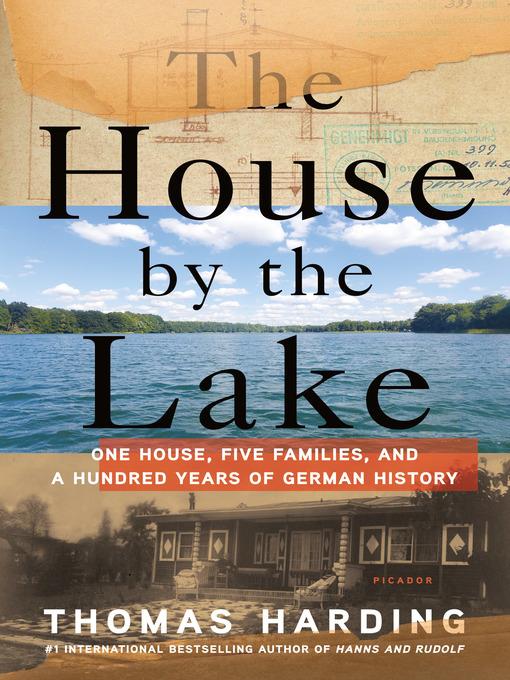
The House by the Lake
One House, Five Families, and a Hundred Years of German History
کتاب های مرتبط
- اطلاعات
- نقد و بررسی
- دیدگاه کاربران
نقد و بررسی

October 31, 2016
Harding (Hanns and Rudolf), a British-American journalist and nonfiction writer, profiles five diverse families that over the course of nearly a century either owned or rented a single house on the outskirts of Berlin. Harding uses these familiesâthe Wollanks, the Alexanders (Harding's ancestors), the Meisels, the Fuhrmanns, and the Kühnsâas a prism through which to look at the history of 20th- and early 21st-century Germany. Given his Jewish family's experience, he pays particular attention to the house and the town in which it was situated, Grosà Glienicke, during WWIIâFrench POWs were housed there, and Soviet forces subjected the town's women to mass rape in 1945âand in the Cold War, when the house and town were located in East Germany. Harding notes how the town prospered after the fall of the Berlin Wall in 1989, but the house itself fell into disrepair, housing squatters until Harding and his family, as well as some locals, made an effort to clean and reconstruct it. Harding's well-written, thoroughly researched work brings a long period of German history down to a local, human scale. Maps & illus. Agent: Patrick Walsh, PEW Literary.

May 15, 2016
The inhabitants of a summer house reveal Germany's political, economic, and social history.In 2013, journalist and biographer Harding (Hanns and Rudolf: The True Story of the German Jew Who Tracked Down and Caught the Kommandant of Auschwitz, 2013) traveled to the lakeside vacation home outside Berlin where his grandmother had spent a bucolic childhood. He was shocked by its condition: abandoned, in disrepair, its roof cracked, its chimneys crumbling, the once-beloved refuge was in possession of the city of Potsdam, scheduled for demolition. The only way to save it, he learned, was to "prove that it was culturally and historically significant." Harding's efforts to amass that proof have resulted in a well-researched, intermittently interesting overview of 20th-century German history, focused on five families who lived in the house. In the 1890s, Otto Wollank, a wealthy businessman, bought the property, adding to his already large holdings in Berlin. In 1927, his son-in-law, an early Nazi supporter, leased part of the land to Harding's great-grandfather Alfred Alexander, a prominent Jewish physician. After the Nazis took power, the Alexanders--including their daughter, who became Harding's grandmother--reluctantly fled to London. Although the author claims that "virulent nationalism and anti-Semitism...[were] a rarity in the Germany of 1929," he concedes that Jews could not serve in the army, secure a university professorship, or hold other state positions without converting to Christianity. The story he tells of Nazi persecution of Jews is, sadly, familiar. After the war, the house's residents included a working-class family whose access to the lake was cut off by the Berlin Wall. Surprisingly, Hardings' relatives responded with hostility to his pleas to claim and restore the house, eventually giving in and participating in a cleanup day. The house was saved, and Harding asks readers to contribute to its restoration. A personal and imaginative yet overlong perspective on German history.
COPYRIGHT(2016) Kirkus Reviews, ALL RIGHTS RESERVED.

May 15, 2016
Journalist Harding (Hanns and Rudolf) provides an absorbing account of a century of German history as it relates to a modest home located by a picturesque lake on the outskirts of Berlin. The author, who grew up in England, heard tales throughout his childhood of this beloved dwelling built in the early 20th century by his great-grandparents. In 2013, he visited the cottage and was saddened to find the building derelict and scheduled for demolition by the local government. In an attempt to save the structure, Harding decided to chronicle what happened to the house after his relatives were forced to flee owing to Nazi persecution in the days before World War II. Interviews with local townspeople and tenacious records research disclosed the stories of the house's residents who arrived after his kinfolk left. Remarkably, during the Cold War, a portion of the Berlin Wall was constructed right next to the property--thus placing the house on the communist side of the divided country. Works such as Christopher Hilton's The Wall have told how the division of Germany affected everyday life. VERDICT This personal saga centered on a family home will appeal to enthusiasts of German history, especially post-World War II division and reunification.--Mary Jennings, Camano Island Lib., WA
Copyright 2016 Library Journal, LLC Used with permission.

June 1, 2016
Harding visits his family's former house, on a lake near Potsdam and Berlin. His middle-class Jewish ancestorsdoctors, lawyers, journalistslived in the house until they were forced by the Nazis to emigrate. For a long time, Albert Alexander, the author's great-grandfather, held out, like many Jews, believing the Nazi threat would subside. Harding recounts not only his family's story but also those of the others who inhabited the beautiful country house, most notably composer (and one-time member of the Nazi party) Will Meisel and, later, secret police informant Wolfgang Kuhne. In doing so, he also traces the complicated German history of the mid- and late-twentieth century. During the Cold War, ironically, the Berlin Wall separated the lake house from the lake; the house's destruction in 1989 and its aftermath provide the most dramatic sections of the book. Some may find the extensive detail supplied about the house and its owners a bit overwhelming, but the overarching notion of using a building to trace a family's and a country's troubled history is affecting and even, at times, inspirational.(Reprinted with permission of Booklist, copyright 2016, American Library Association.)

























دیدگاه کاربران